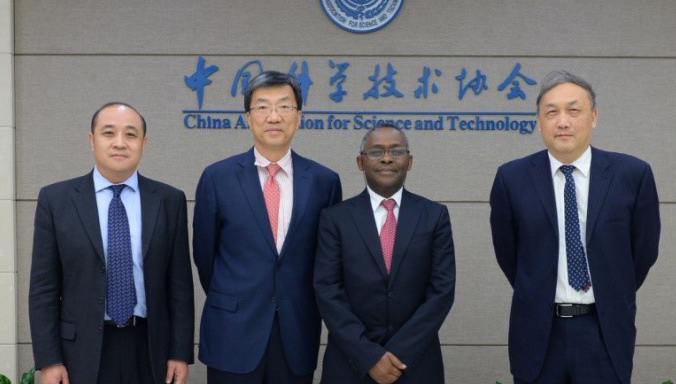At a series of high-level meetings, TWAS Executive Director Romain Murenzi held talks with Chinese Minister of Science and Technology Wang Zhigang and other top Chinese science and education leaders to explore joint efforts to advance science in the Global South.
In addition to visiting the Ministry, Murenzi met with officials from the Chinese Academy of Sciences (CAS), the National Natural Science Foundation of China (NSFC), the China Association for Science and Technology (CAST) and Zhejiang University. During his five-day visit to Beijing and Hangzhou in late May, talks focused on the Academy’s future collaboration with Chinese institutions.
 "China's commitment to scientific research and to international cooperation is so impressive – it is a true reflection of global leadership in science and technology," Murenzi said. "Meeting with Minister Wang and the other leaders, it was clear that we share high ambitions and many common goals, including the advancement of science in Least Developed Countries, with special attention to Africa and women. I look forward to advancing the long-standing, productive partnership between TWAS and China."
"China's commitment to scientific research and to international cooperation is so impressive – it is a true reflection of global leadership in science and technology," Murenzi said. "Meeting with Minister Wang and the other leaders, it was clear that we share high ambitions and many common goals, including the advancement of science in Least Developed Countries, with special attention to Africa and women. I look forward to advancing the long-standing, productive partnership between TWAS and China."
During the visit, Murenzi also met with CAS President Bai Chunli, who served six years as TWAS president before his term ended in December 2018. TWAS Treasurer Yang Wei played a crucial role in organising the meetings. Yang served as president of NSFC from 2013 to 2018 and as president of Zhejiang University from 2002-2013. Murenzi also met with TWAS Fellow Wang Shouyang, a distinguished economist who serves as dean of the School of Economics and Management at the University of Chinese Academy of Sciences and chairman of the Committee for the TWAS Siwei Cheng Prize for Economics.
China and TWAS have a cooperative relationship that extends to the Academy's early days more than 35 years ago. Under Bai's leadership, the CAS-TWAS President’s PhD Fellowship Programme admitted hundreds of promising young scientists from the Global South into PhD studies in China. In addition, six CAS-TWAS Centres of Excellence were founded and focus on key areas for scientific development.
Wang, who leads the Ministry of Science and Technology (MoST), noted the long cooperative history in his discussions with Murenzi. MoST will continue joint efforts with TWAS, he said. He emphasised the importance of working within the framework of China's Belt and Road Initiative and the value of possible collaboration in areas relevant to the Fourth Industrial Revolution.
At NSFC, Murenzi met with Li Jinghai, president of the Foundation and a vice president of the Paris-based International Science Council (ISC).
At CAST, Murenzi met with a group led by Huai Jinpeng, executive vice president and chief executive secretary, and including Liu Yang, director-general of the CAST Department of International Affairs. CAST is a non-governmental organisation representing 210 national member societies and local branches all over the country. CAST agreed to support the meeting of the TWAS Council in Hangzhou in November.
Huai and Murenzi discussed improving scientific exchanges and cooperation with the Academy. Huai said CAST, a major driver of Chinese science diplomacy, and TWAS, which is globally active in science diplomacy, can carry out in-depth collaboration on academic exchanges, science communication, international cooperation, science education and talent cultivation.
CAST, Huai said, cultivates young professionals in science and technology through such initiatives as its Young Elite Scientist Sponsorship Program and the Science & Technology Award for Chinese Youth and Future Women Scientists. Huai said he hoped the two organisations could collaborate on nurturing early-career scientists through a bond of common values and goals.
Murenzi also met with Wu Zhaohui, president of Zhejiang University, and discussed the university as the site of the TWAS Council meeting.
Wu said the university is focused on research and innovation and that it welcomes extensive exchanges and cooperation with international science organisations like TWAS. Murenzi said he hopes the Academy will explore opportunities to promote scientific development in the Global South alongside the university, and they reached a consensus on co-sponsoring international collaboration and strengthening cooperation with private enterprise.
Sean Treacy and Edward Lempinen

